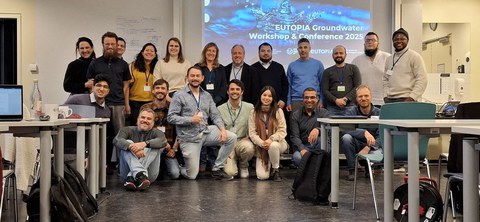26.03.2025
2. EUTOPIA Grundwasserworkshop und Konferenz 2025 in Dresden
Da Wasserknappheit und Klimawandel zunehmen, erweist sich die künstliche Grundwasseranreicherung (engl. Managed Aquifer Recharge - MAR) als eine vielversprechende Strategie für das nachhaltige Managemegement von Wasserressourcen. Während die technischen und ökologischen Vorteile relativ gut dokumentiert sind, bleibt die Bewertung der breiteren Auswirkungen auf die Gesellschaft und Ökosysteme eine komplexe Herausforderung. Mit anderen Worten: Der Erfolg der MAR-Implementierung geht weit über die einfache Überwachung des Grundwasserspiegels hinaus. Doch wie kann dieser Erfolg eigentlich gemessen werden? Wie lassen sich die ökologischen, sozialen und wirtschaftlichen Vorteile von MAR einfach und unkompliziert quantifizieren und welche Indikatoren sollten dafür verwendet werden?
Dies war das Hauptthema der Zweiten EUTOPIA Groundwater Workshop and Conference, die vom 12. bis 14. März 2025 von der Forschungsgruppe INOWAS am Institut für Grundwasserwirtschaft in Zusammenarbeit mit dem Department of Water and Climate an der Vrije Universiteit Brussel organisiert wurde. Die Veranstaltung fand im Kontext des Netzwerkes „Digitalisierung zur Reduzierung hydroklimatischer Risiken“ der EUTOPIA University Alliance statt und umfasste zwei Teilen: einen zweitägigen Trainingsworkshop und einen Rundtischgespräch, ähnlich wie die erste Konferenz dieser Reihe, die im April 2024 von der VUB in Brüssel organisiert wurde.
Für den Trainingskurs konzentrierten wir uns auf die Planung und Optimierung von MAR-Anlagen mithilfe der webbasierten Grundwassermodellierungsplattform INOWAS (www.inowas.com). Die Plattform beinhaltet verschiedene Simulationstools, darunter eine MODFLOW-basierte Schnittstelle, die es den Teilnehmenden ermöglicht, Grundwasserströmungsmodelle direkt über den Browser zu erstellen, auszuführen und zu analysieren. Zunächst entwickelten die Teilnehmenden ein konzeptionelles Modell für eine spezifische MAR-Anlage, das anschließend numerisch über die INOWAS-Plattform implementiert und diskutiert wurde.
Es war beeindruckend zu sehen, mit welcher Motivation und welchem Engagement alle Teilnehmenden arbeiteten, sowie die enge Zusammenarbeit zwischen den Forschenden verschiedener europäischer Universitäten zu beobachten. In kurzer Zeit wurde ein konzeptionelles MAR-Model entworfen und in ein numerisches Modell implementiert. Anschließend wurde die Auswirkung der MAR-Anlage auf das darunterliegende Grundwassersystem mithilfe der webbasierten INOWAS-Plattform analysiert und erörtert. Alle Teilnehmenden haben hervorragende Arbeit geleistet, und wir sind sehr dankbar, dass unsere INOWAS-Plattform so intensiv genutzt wurde, wodurch wir wertvolles Feedback und Vorschläge für zukünftige Updates erhielten.
Die Konferenz wurde am dritten Tag mit einem Rundtischgespräch fortgesetzt. Nachdem wir uns an den ersten beiden Tagen intensiv mit den technischen Herausforderungen der MAR-Modellierung befasst hatten, war es an der Zeit, unsere Komfortzone zu verlassen und MAR aus einer völlig anderen Perspektive zu betrachten. In Kleingruppen diskutierten wir verfügbare technische, ökologische, soziale und wirtschaftliche Bewertungsmethoden für MAR mit dem Ziel, Wissenslücken zu identifizieren und konvergierende Indikatoren für eine integrierte Quantifizierung der gesellschaftlichen Vorteile von MAR vorzuschlagen. Zu den Aufgaben gehörten die Erweiterung der Liste der Bewertungsmethoden, ihre Rangfolge anhand verschiedener Kriterien (z. B. benötigte Daten, erforderliche Fachkenntnisse oder Ressourcen, Anwendbarkeit über verschiedene Skalen und Sektoren hinweg, Genauigkeit der Anwendung etc.) sowie die Identifikation von Stärken und Schwächen jeder Methode und ihrer zugehörigen Indikatoren.
Insgesamt ermöglichte die Konferenz die Erschließung neuer Partnerschaften und stärkte die bestehenden Kooperationen innerhalb der EUTOPIA University Alliance und der MAR-Community. Die Teilnehmenden konnten gemeinsame Interessen, komplementäre Fachkenntnisse und potenzielle Kooperationsmöglichkeiten identifizieren.

